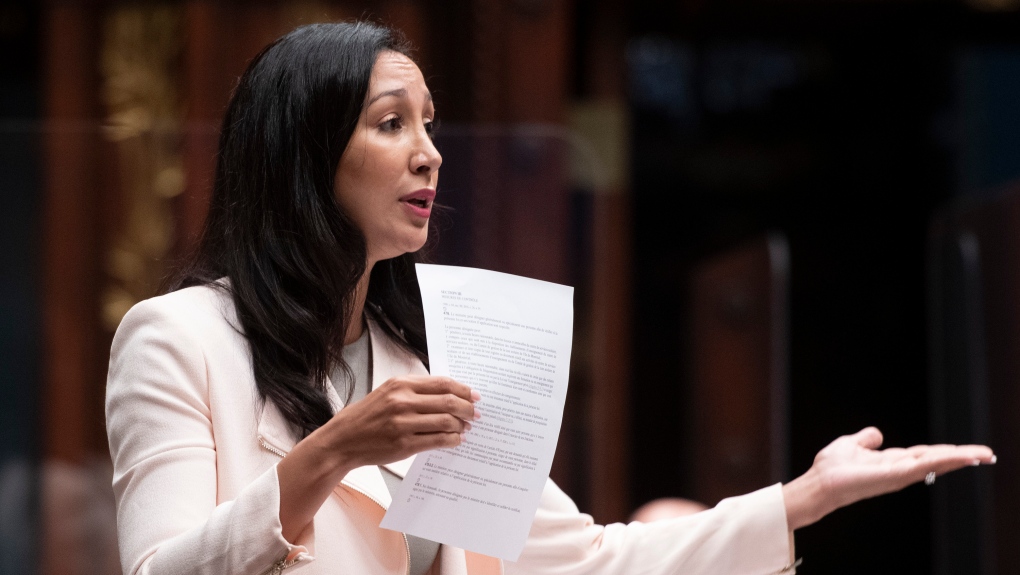Air quality and COVID-19: Quebec Opposition MNA tables bill to install air monitors, purifiers in every classroom
A bill introduced to the national assembly Wednesday would equip every Quebec classroom with an air purifier and sensor that monitors carbon dioxide levels, impose new maximum CO2 concentrations, and make CO2 data available to the public.
Higher levels of CO2 concentrations suggest air isn’t circulating properly indoors, signifying a higher potential for the spread of COVID-19. While the province considers 1,000 parts per million (ppm) to be an ideal target, data presented by the ministry last week suggests 724 classrooms have a weekly average CO2 concentration that exceeds 1,500 parts per million (ppm), while 72 classrooms exceed 2,000 ppm.
Quebec Liberal MNA Marwah Rizqy tabled Bill 192, An Act to ensure student health and safety in the classroom by regulating ambient air quality in schools, with hopes that the national assembly will move quickly to pass it.
“We can work on this bill right now,” Rizqy told reporters in Quebec City.
“The (Parti Quebecois) makes a big deal about King Charles, and now we are able to table a bill within a few days,” she said in reference to Bill 4, which aims to make the King's oath optional and allow PQ members to sit without swearing allegiance to the British monarchy.
Time is of the essence, as it was highlighted earlier this month by Quebec Education Minister Bernard Drainville that carbon dioxide concentrations are likely to rise as the weather gets colder and schools close their windows.
 Quebec Liberal Opposition Education and Higher Education Critic Marwah Rizqy questions the government during question period in this file photo dated Thursday, September 23, 2021. THE CANADIAN PRESS/Jacques Boissinot
Quebec Liberal Opposition Education and Higher Education Critic Marwah Rizqy questions the government during question period in this file photo dated Thursday, September 23, 2021. THE CANADIAN PRESS/Jacques Boissinot
Under Rizqy’s bill, the 1,000 ppm target would become the legal limit. Schools would be compelled to provide weekly reports to the ministry, which would then be made public.
The proposed limit is even tighter during pandemic times, restricting the acceptable limit to 800 ppm until the WHO says the health crisis is over.
"The particles, they are in the air and they remain in the air for 12 to 48 hours," said Nancy Delgrave, scientific coordinator of the COVID-STOP group, who appeared with Rizqy during Wednesday's press conference.
"To reduce the contagion of respiratory viruses, and also to reduce their severity, it is important to treat the air," she said.
A VOW FROM THE FORMER MINISTER
Last year, then-Education Minister Jean-Francois Roberge vowed to equip classrooms with CO2 detectors by the end of the 2022 school year, following concerns over air quality in schools.
At the time, the minister released a letter to directors general outlining his plans to require the readers in libraries, gymnasiums, daycare rooms and other spaces.
CTV News has reached out to the ministry for a status update on the rollout of the devices.
"Laying down a bill at this point is redundant, I believe," said Quebec Provincial Association of Teachers President Heidi Yetman.
She told CTV she would rather the province prioritize classroom repairs.
"We need to make sure the windows are able to open. We have to make sure that we have ventilation," she said.
-- Published with files from The Canadian Press
CTVNews.ca Top Stories

Video shows suspect setting Toronto-area barbershop on fire
Video of a suspect lighting a Richmond Hill barbershop on fire earlier this week has been released by police.
'I have the will to live': N.B. woman needs double lung transplant
A New Brunswick woman suffering from sarcoidosis, a disease that limits your lung capacity, is in need of a double lung transplant.
The kids from 'Mrs. Doubtfire are all SUPER grown up now, and we're not OK
The adorable trio of child actors from the 1993 classic comedy 'Mrs. Doubtfire,' which starred the late and great Robin Williams, are all grown up and looking back on their seminal time together.
Police officer hit by driver of fleeing vehicle in Toronto
York Regional Police say they are continuing to search for a suspect in an auto theft investigation who was captured on video running over a police officer in Toronto last month.
TD worst-case scenario more likely after drug money laundering allegations: analyst
TD Bank Group could be hit with more severe penalties than previously expected, says a banking analyst after a report that the investigation it faces in the U.S. is tied to laundering illicit fentanyl profits.
A Chinese driver is praised for helping reduce casualties in a highway collapse that killed 48
A Chinese truck driver was praised in local media Saturday for parking his vehicle across a highway and preventing more cars from tumbling down a slope after a section of the road in the country's mountainous south collapsed and killed at least 48 people.
Britney Spears 'home and safe' after paramedics responded to an incident at the Chateau Marmont, source tells CNN
A source close to singer Britney Spears tells CNN that the pop star is 'home and safe' after she had a 'major fight' with her boyfriend on Wednesday night at the Chateau Marmont in West Hollywood.
Suter scores late goal, clinches series for Canucks
Pius Suter scored with 1:39 left and the Vancouver Canucks advanced to the second round of the NHL playoffs with a 1-0 victory over the Nashville Predators on Friday night in Game 6.
Premier Legault reiterates that McGill pro-Palestinian camp must be dismantled
Quebec Premier François Legault reiterated that the pro-Palestinian encampment at McGill University must be dismantled while police remain 'on the lookout for new developments.'






























